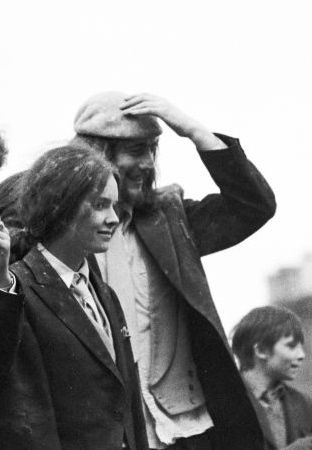Ed Moloney sets out the reasons Gerry Adams was not called as witness during his brother Liam's rape trial. Ed Moloney blogs @ The Broken Elbow.
Although the Sinn Fein leader Gerry Adams made a lengthy and controversial appearance as a prosecution witness at the April 2013 trial of his brother Liam, on charges that he had sexually abused his daughter Ainé, there has always been a mystery surrounding his failure to appear as a witness at the second trial in September 2013.
The first trial, which lasted three weeks, was abandoned when it was discovered that the judge, Corinne Philpott had failed to make a file available to the defence and so the jury was discharged and a date then set for a second hearing.
The file contained social service and medical reports dealing with Ainé Adams, but the judge withheld the file, only passing it on to the defence legal team well into the second week and as Liam Adams’ lawyers were about to start their closing submissions.
When the defence team told the judge that they thought the file should have been handed over at the start of the trial, she decided to halt proceedings, discharge the jury and order a new trial, which took place some five months later.
Although the media then gathered at the courthouse in the expectation that Gerry Adams would make a second appearance as a prosecution witness they were to be disappointed. He failed to appear and although the jury in the second trial did, after they retired to consider the verdict, ask the judge why Gerry Adams had not testified this time, her answer to them was not made public.
That answer can now be revealed.
Gerry Adams had been caught out in so many contradictions and factual errors during a bruising cross-examination by Eilis McDermott QC, that when the retrial was ordered, the defence legal team served notice on the Crown that they planned to make ‘a bad character application’ in relation to the Sinn Fein president.
One of the most controversial chapters explored by Ms McDermott in her cross-examination of Gerry Adams has become known as ‘the walking in the rain in Dundalk’ incident, so-called because of claim from Gerry Adams that in 2000, Liam had admitted to sexually abusing Ainé while the pair were walking through Dundalk during a downpour.
It was controversial because Gerry Adams failed to mention the incident when he made his first statement to the PSNI about his brother’s alleged sexual abuse in 2007, but did when he made a second statement in 2009. The second statement was made, however, a month before Gerry Adams was to be interviewed for a UTV programme during which both Ainé and her mother claimed they had told Gerry Adams all about the abuse allegations.
The exchange ended with Ms McDermott suggesting to Gerry Adams that he gone to the PSNI in 2009 with a fresh allegation against his brother, ‘….to save your political skin’.
A ‘bad character application’ was made possible by the Criminal Justice Act of 2003 (CJA) which allowed courts to grant permission for evidence to be introduced relating to the character of witnesses as well as defendants, the admissibility of previous convictions and the propensity to commit other like offences and untruthfulness.
The application can be made by either the prosecution or the defence, although in practice it is mostly prosecutors who have availed themselves of this ploy.
Sections 100(1)(a) and (b) of the CJA give two formal grounds for introducing such evidence: “it is important explanatory evidence” and/or “it has substantial probative value in relation to a matter which (a) is a matter of issue in the proceedings and (b) is of substantial importance in the context of the case as a whole”.
Clearly an application under Section 100(b) in the Liam Adams’ retrial would have been difficult for any judge to resist.
This would have enabled Liam Adams’ barrister, EIlis McDermott to cross-examine Gerry Adams about his alleged IRA career and his denials thereof, as well as to delve into some of the more controversial episodes with which he has been associated, including the IRA disappearance of a number of people in the 1970’s such as the widowed mother-of-ten Jean McConville.
The purpose of this would be to demonstrate a history and pattern of deception and untruthfulness by Gerry Adams which would make the allegations he made against his brother, Liam suspect and dubious.
The stage would have been set for an historic and sensational confrontation between one of the Belfast Bar’s most skilled inquisitors and arguably Ireland’s most politically acrobatic politician.
But it was not to be.
When the Liam Adams’ defence informed the Public Prosecutor’s office that they planned to apply for ‘bad character’ evidence in relation to his brother, Gerry, the prosecution service withdrew Gerry Adams as a witness, arguing that they did not have sufficient time to respond. The Public Prosecution Service (PPS) claimed that compiling the necessary material on Gerry Adams could cause a delay of up to two years in the retrial.
Although the defence argued back that since the Ainé Adams case had been started in 2006, when she re-activated a complaint first made in February 1987, the PPS had had plenty of time to compile information on one of its star witnesses, the decision to exclude the Sinn Fein leader from the roster of prosecution witnesses was final.
The PPS’ decision leaves the North’s prosecutors facing the charge that they dropped Gerry Adams as a witness to save him the ordeal and embarrassment of being grilled in a witness box about matters he normally was able to deal with in the comfort of a TV studio, often being questioned by friendlier interrogators and under conditions which sometimes gave him control of the subjects to be addressed.
If Gerry Adams had given evidence at the retrial and been quizzed by Ms McDermott about his controversial past, an obvious and intriguing question raises its head: would Crown prosecutors have stepped in to assist Mr Adams’ defence that he had never been in the IRA, much less was responsible for sending people to unmarked graves?
But the PPS’ most likely defence, which might well be that they dropped Mr Adams for fear of seeing one of their key witnesses destroyed and their prosecution fatally undermined, also suffers a major handicap.
If Mr Adams had so many credibility problems, why did the PPS decide to use him in the first place? And why hadn’t they anticipated this sort of problem cropping up?
The affair raises two very different and troubling questions. One concerns special treatment given to the Sinn Fein leader by the PPS. The other is about the level of competence in the prosecutors’ office.
As things turned out, the major beneficiary of the affair was the North’s Director of Public Prosecutions, Barra McGrory QC, who was Gerry Adams’ lawyer before his elevation. The removal of Gerry Adams from the witness list for the second trial meant that Mr McGrory’s role in the affair has escaped a scrutiny that some of his legal colleagues suggest it deserves.
 |
Gerry and Liam Adams in earlier and happier days
|
The file contained social service and medical reports dealing with Ainé Adams, but the judge withheld the file, only passing it on to the defence legal team well into the second week and as Liam Adams’ lawyers were about to start their closing submissions.
When the defence team told the judge that they thought the file should have been handed over at the start of the trial, she decided to halt proceedings, discharge the jury and order a new trial, which took place some five months later.
Although the media then gathered at the courthouse in the expectation that Gerry Adams would make a second appearance as a prosecution witness they were to be disappointed. He failed to appear and although the jury in the second trial did, after they retired to consider the verdict, ask the judge why Gerry Adams had not testified this time, her answer to them was not made public.
That answer can now be revealed.
Gerry Adams had been caught out in so many contradictions and factual errors during a bruising cross-examination by Eilis McDermott QC, that when the retrial was ordered, the defence legal team served notice on the Crown that they planned to make ‘a bad character application’ in relation to the Sinn Fein president.
 |
Eilis McDermott, in a photo taken when she was a law student at QUB
|
One of the most controversial chapters explored by Ms McDermott in her cross-examination of Gerry Adams has become known as ‘the walking in the rain in Dundalk’ incident, so-called because of claim from Gerry Adams that in 2000, Liam had admitted to sexually abusing Ainé while the pair were walking through Dundalk during a downpour.
It was controversial because Gerry Adams failed to mention the incident when he made his first statement to the PSNI about his brother’s alleged sexual abuse in 2007, but did when he made a second statement in 2009. The second statement was made, however, a month before Gerry Adams was to be interviewed for a UTV programme during which both Ainé and her mother claimed they had told Gerry Adams all about the abuse allegations.
The exchange ended with Ms McDermott suggesting to Gerry Adams that he gone to the PSNI in 2009 with a fresh allegation against his brother, ‘….to save your political skin’.
A ‘bad character application’ was made possible by the Criminal Justice Act of 2003 (CJA) which allowed courts to grant permission for evidence to be introduced relating to the character of witnesses as well as defendants, the admissibility of previous convictions and the propensity to commit other like offences and untruthfulness.
The application can be made by either the prosecution or the defence, although in practice it is mostly prosecutors who have availed themselves of this ploy.
Sections 100(1)(a) and (b) of the CJA give two formal grounds for introducing such evidence: “it is important explanatory evidence” and/or “it has substantial probative value in relation to a matter which (a) is a matter of issue in the proceedings and (b) is of substantial importance in the context of the case as a whole”.
Clearly an application under Section 100(b) in the Liam Adams’ retrial would have been difficult for any judge to resist.
This would have enabled Liam Adams’ barrister, EIlis McDermott to cross-examine Gerry Adams about his alleged IRA career and his denials thereof, as well as to delve into some of the more controversial episodes with which he has been associated, including the IRA disappearance of a number of people in the 1970’s such as the widowed mother-of-ten Jean McConville.
The purpose of this would be to demonstrate a history and pattern of deception and untruthfulness by Gerry Adams which would make the allegations he made against his brother, Liam suspect and dubious.
The stage would have been set for an historic and sensational confrontation between one of the Belfast Bar’s most skilled inquisitors and arguably Ireland’s most politically acrobatic politician.
But it was not to be.
When the Liam Adams’ defence informed the Public Prosecutor’s office that they planned to apply for ‘bad character’ evidence in relation to his brother, Gerry, the prosecution service withdrew Gerry Adams as a witness, arguing that they did not have sufficient time to respond. The Public Prosecution Service (PPS) claimed that compiling the necessary material on Gerry Adams could cause a delay of up to two years in the retrial.
Although the defence argued back that since the Ainé Adams case had been started in 2006, when she re-activated a complaint first made in February 1987, the PPS had had plenty of time to compile information on one of its star witnesses, the decision to exclude the Sinn Fein leader from the roster of prosecution witnesses was final.
The PPS’ decision leaves the North’s prosecutors facing the charge that they dropped Gerry Adams as a witness to save him the ordeal and embarrassment of being grilled in a witness box about matters he normally was able to deal with in the comfort of a TV studio, often being questioned by friendlier interrogators and under conditions which sometimes gave him control of the subjects to be addressed.
If Gerry Adams had given evidence at the retrial and been quizzed by Ms McDermott about his controversial past, an obvious and intriguing question raises its head: would Crown prosecutors have stepped in to assist Mr Adams’ defence that he had never been in the IRA, much less was responsible for sending people to unmarked graves?
But the PPS’ most likely defence, which might well be that they dropped Mr Adams for fear of seeing one of their key witnesses destroyed and their prosecution fatally undermined, also suffers a major handicap.
If Mr Adams had so many credibility problems, why did the PPS decide to use him in the first place? And why hadn’t they anticipated this sort of problem cropping up?
The affair raises two very different and troubling questions. One concerns special treatment given to the Sinn Fein leader by the PPS. The other is about the level of competence in the prosecutors’ office.
As things turned out, the major beneficiary of the affair was the North’s Director of Public Prosecutions, Barra McGrory QC, who was Gerry Adams’ lawyer before his elevation. The removal of Gerry Adams from the witness list for the second trial meant that Mr McGrory’s role in the affair has escaped a scrutiny that some of his legal colleagues suggest it deserves.









There is something very rotten at the heart of the PPS.
ReplyDelete